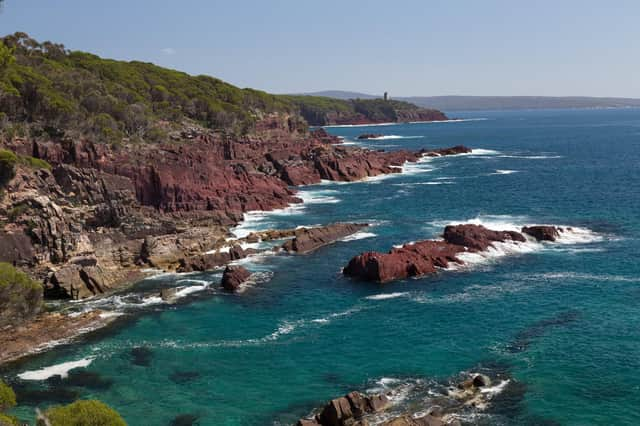Call for Australian national park that honours Scots colonialist and 'blackbirder' to be renamed


The custodians of Ben Boyd National Park, which spans 104 acres of coastal territory, have come under pressure from an indigenous group to change the name of the beauty spot.
Boyd, originally from Penninghame in Wigtownshire, is accused of being a ‘blackbirder’ – or a landowner who assisted in the practice of bringing tens of thousands of Pacific Islanders to Australia to work, often by force or trickery.
Advertisement
Hide AdAdvertisement
Hide AdBoyd brought South Sea Islanders to Eden and the Monaro region in the 1840s to work his pastoral and whaling operations where he was already using Aboriginal and Maori labour.
As well as the national park, Boyd’s name also lives on in a sandstone whaling tower and the hamlet of Boydtown, near Eden.
State Environment Minister Matt Kean said he was “very concerned” about the issue and called for a full review.
He added: "I have a huge amount of respect for our Indigenous people and their living history. Our national parks are about connecting people, not dividing them.
"I will be seeking a full briefing on this matter from my department and intend to discuss it with local elders and the community."
An academic paper published by Clive Moore from the University of Queensland in 2013 found Boyd was already using Aboriginal and Maori labourers when he chartered a ship to illegally bring 65 Melanesian labourers to Boydtown on April 16, 1847.
Boyd stopped the practice after the NSQ Government launched an investigation but the Scot refused to take responsibility for the people he had shipped in.
Some died in the cold conditions of the Monaro plains and others walked to Sydney to try and find a way home.
Advertisement
Hide AdAdvertisement
Hide AdSteven Holmes, who is of Thaua Aboriginal heritage, is campaigning for the name change.
He said: “It bugs a lot of people. They know the truth and a lot of people won't admit, they won't come out and say it was wrong.
"[Boyd] did a lot of damage. And naming the parks after him? No, that's wrong.
"The truth needs to come out and a lot of people have got their head stuck in the sand."
Emelda Davis, who chairs cultural support group Australian South Sea Islanders, told ABC News that the Black Lives Matter movement had reinvigorated calls to replace Boyd's name.
She said: "The history that goes with Ben Boyd as a character is unsavoury.
"This frustration that you can see on a global scale is evidence of those who have been oppressed through slavery and exploitation."
Born in 1801 in south west Scotland, Boyd later worked as a stockbroker in London and first laid out his plans to “further develop the resources of Australia and its adjacent islands” in 1840.
Advertisement
Hide AdAdvertisement
Hide AdHe believed that large steamships were the only way to secure good communication between the islands and asked the Colonial Office for permission to select five or six locations on the Australian coast for harbours and coaling stations, with the right to buy land near by.
He was given £1M for his grand play by the Royal Bank of Australia in London, of which he was a director, and arrived in Port Jackson on July 18 1842.
According the Australian Dictionary of Biography, Boyd lost no time in launching his various enterprises and quickly set up a branch of the Royal Bank, launched steamship routes and whaling stations and within two years of his arrival became of the largest landholders and graziers in the colony.
During the 1840s, his bank had more than 160,000 sheep and controlled over 2,500,000 acres in the Monaro and Riverina alone, for which he paid a trifling licence fee.
In 1843, in evidence to the select committee on immigration, he said he wanted to pay shepherds £10 a year, with rations, to look after the vast flocks on his holdings. Rations included meat and flour, but not tea and sugar which he considered luxuries.
He was regarded as typical of the 'the haughty gentlemanly, selfish class he represented'.
Boyd looked for alternative sources of employment and started recruiting labour from the Pacific Islands in 1847, when some 200 natives from Tanna (New Hebrides) and Lifu (Loyalty Islands) and other islands were brought to the colony as shepherds and labourers, but most of them were sent home by the end of the year.
There were also rumours that many had been brought to the colony against their will; these charges were investigated by the attorney-general in Sydney and in December 1847 Sir Charles FitzRoy reported to the Colonial Office that they had been found unsubstantiated.
Advertisement
Hide AdAdvertisement
Hide AdA message from the Editor:Thank you for reading this story on our website. While I have your attention, I also have an important request to make of you.With the coronavirus lockdown having a major impact on many of our advertisers - and consequently the revenue we receive - we are more reliant than ever on you taking out a digital subscription.Subscribe to scotsman.com and enjoy unlimited access to Scottish news and information online and on our app. With a digital subscription, you can read more than 5 articles, see fewer ads, enjoy faster load times, and get access to exclusive newsletters and content. Visit https://www.scotsman.com/subscriptions now to sign up.
Our journalism costs money and we rely on advertising, print and digital revenues to help to support them. By supporting us, we are able to support you in providing trusted, fact-checked content for this website.
Joy Yates
Editorial Director